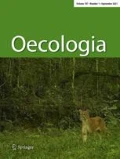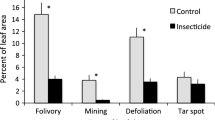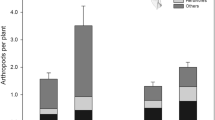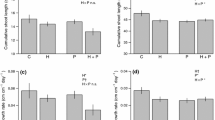Abstract
. Insectivorous birds have been shown to have direct effects on abundances of herbivorous arthropods, but few studies have tested the indirect effects of birds on plant performance through consumption of herbivorous insects. In a 3-year study at the Hubbard Brook Experimental Forest, New Hampshire, we tested whether bird predation indirectly affects leaf herbivory levels and leaf and shoot biomass production of understory sugar maple (Acer saccharum) saplings. Trees were randomly assigned to one of four treatments: an insecticide application to reduce herbivory levels, exclosures that prevented bird access, addition of Lepidoptera larvae, and controls. Trees sprayed with an insecticide supported significantly fewer Lepidoptera larvae than other treatments throughout the study. Also, trees in exclosures supported more Lepidoptera larvae than controls during one count each year, and pooled across all counts during the second year. As predicted, the mean proportion of leaf area consumed varied significantly among treatments and was least in the insecticide treatment, followed by controls, exclosures, and Lepidoptera additions. Significant differences among treatments in herbivory levels, however, did not lead to differences in leaf or shoot biomass production. Thus, bird predation decreased Lepidoptera abundances and decreased herbivory levels, but did not increase biomass production during the following year. Over 85% of the herbivores in our study were Homoptera nymphs that were not folivorous and are not important bird prey items, potentially dampening the indirect effects of bird predation on biomass production. A comparison of these results with previous studies suggests that the indirect effects of bird predation on plant biomass production may depend on the plant species, abundance and composition of the herbivore community, and primary productivity of the ecosystem.
Similar content being viewed by others
Author information
Authors and Affiliations
Additional information
Electronic Publication
Rights and permissions
About this article
Cite this article
Strong, A., Sherry, T. & Holmes, R. Bird predation on herbivorous insects: indirect effects on sugar maple saplings. Oecologia 125, 370–379 (2000). https://doi.org/10.1007/s004420000467
Received:
Accepted:
Published:
Issue Date:
DOI: https://doi.org/10.1007/s004420000467




